| Srl | Item |
| 1 |
ID:
106597
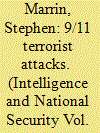

|
|
|
|
|
| Publication |
2011.
|
| Summary/Abstract |
The 9/11 terrorist attacks have been intensively examined as both tactical and strategic intelligence failures but less attention has been paid to the policy failures which preceded them. Perhaps this is due to the presumption that intelligence analysis influences decision-making as a precursor to and foundation for policy. This assumption about the influence of analysis on decision deserves a much closer examination. The 9/11 terrorist attacks provide a good case to study for greater understanding of the influence, or lack of influence, that intelligence analysis has on decision-making. Specifically, the 9/11 Commission Report identifies as a significant failure the lack of a National Intelligence Estimate on the terrorist threat between 1998 and 2001, and implies that if one had been produced it might have helped enable decision-makers to prevent the 9/11 attacks. In other words, a failure of strategic intelligence analysis lay at the foundation of the failure to prevent 9/11. But was this really the case? This article takes a closer look at the case of the missing National Intelligence Estimate by first evaluating what decision-makers knew about the threat prior to the 9/11 attacks, the policies they were implementing at the time, and the extent to which the hypothetical National Intelligence Estimate described by the 9/11 Commission would have mattered in terms of influencing their judgement and policy for the better. It concludes that the 9/11 terrorist attacks were more a failure of policy than strategic intelligence analysis.
|
|
|
|
|
|
|
|
|
|
|
|
|
|
|
|
| 2 |
ID:
106600
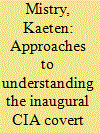

|
|
|
|
|
| Publication |
2011.
|
| Summary/Abstract |
The Italian election of April 1948 represented the first occasion on which the CIA intervened to influence events abroad. Understanding of the operation has been shaped by three dissimilar approaches that have been critical, celebratory, and stressed continuity. These approaches have, in turn, fuelled a series of useful myths around the episode. Agency declarations of greater 'openness' after the Cold War promised to advance historiographical debates on this - and other - interventions through the declassification of records, although proved a false dawn. This article offers an alternative method to analyse the case through a broader international frame of inquiry that considers CIA action in the context of both American and Italian efforts during the election. In so doing, it challenges the useful myths around 1948.
|
|
|
|
|
|
|
|
|
|
|
|
|
|
|
|
| 3 |
ID:
106594
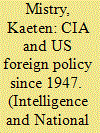

|
|
|
| 4 |
ID:
106605
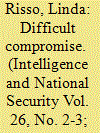

|
|
|
|
|
| Publication |
2011.
|
| Summary/Abstract |
The launch of the Western Union in 1948 and the creation of the NATO Information Service in 1950 were important steps in the coordination of the Western response to Soviet and Soviet-inspired propaganda campaigns. By examining how the British Information Research Department worked closely with the International Organizations Division of the CIA in shaping the foundation and early activities of these intergovernmental agencies, this article offers new insight into the role of national information agencies within international organizations and contributes to explaining why, in the early Cold War, the West struggled to produce a coherent and fully coordinated propaganda response to communism.
|
|
|
|
|
|
|
|
|
|
|
|
|
|
|
|
| 5 |
ID:
106599
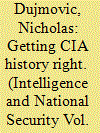

|
|
|
| 6 |
ID:
106608
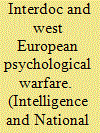

|
|
|
|
|
| Publication |
2011.
|
| Summary/Abstract |
Interdoc, or the International Documentation and Information Center, was established in The Hague in early 1963 in order to coordinate a transnational network of institutes active in the field of analysing trends in communist ideology and societies. The product of deliberations between intelligence agencies and the private sector in Western Europe during the late 1950s, Interdoc reflected a need to develop and project a European stance on Cold War issues separate from an all-dominant US influence. Yet the Americans were present from the beginning, and their involvement gradually increased over time. This article covers the details of this involvement and uses it to comment on how Interdoc represents an interesting case of inter-service cooperation in anti-communist activities in the West.
|
|
|
|
|
|
|
|
|
|
|
|
|
|
|
|
| 7 |
ID:
106602
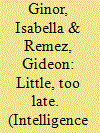

|
|
|
|
|
| Publication |
2011.
|
| Summary/Abstract |
The authors' previous research has established that the 1967 Arab-Israeli Six-Day War resulted from a deliberate Soviet plan to provoke Israel into a pre-emptive strike, which would legitimize and trigger a massive Soviet military intervention to aid an Egyptian-Syrian counteroffensive. However, US documents released until recently provided no evidence that the American intelligence community, and particularly the CIA, detected this threat or informed the political leadership about it - even though some indications were picked up at the field level. A newly declassified, retrospective report appears for the first time to show that there was awareness of major components of the Soviet operation (preparations for a naval landing and parachute drop). But closer scrutiny finds that this report reflects Soviet propaganda more than factual intelligence - thus further tarnishing what has hitherto been held as an outstanding achievement for the Agency and its chief.
|
|
|
|
|
|
|
|
|
|
|
|
|
|
|
|
| 8 |
ID:
106611
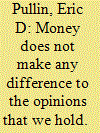

|
|
|
| 9 |
ID:
106601
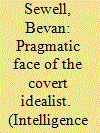

|
|
|
|
|
| Publication |
2011.
|
| Summary/Abstract |
Assessments of the CIA's role in Latin America during the 1950s have tended to focus predominantly on the twin case studies of Guatemala and Cuba. Consequently, the Agency's role - and, more broadly, that of its head Allen Dulles - has come to be seen as one obsessed with covert action and relatively unimportant in terms of policy discussions. Dulles, in fact, has been portrayed as an unwilling and disinterested participant in policy discussions. The present article will challenge those assertions by suggesting that, by examining Dulles's role in the Eisenhower administration's discussions on Latin America, a different picture emerges - one that paints Dulles as an active and rational participant, and which raises important questions for our understanding of the CIA's role during the Eisenhower era.
|
|
|
|
|
|
|
|
|
|
|
|
|
|
|
|
| 10 |
ID:
106595
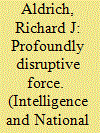

|
|
|
|
|
| Publication |
2011.
|
| Summary/Abstract |
This essay argues that, since 1989, the CIA has been slow to understand the transformative impact of globalization upon its own activities as an intelligence agency. While the CIA spent considerable time examining global trends as part of its work on generalized strategic analysis, its thinking about how globalization would change its own business was less prescient. This problem is explained in terms of the way in which debates over the CIA have been framed historiographically. While intelligence studies as a subject has been successfully integrated into mainstream international history, it has failed to make the same connections with international relations. As a result, those debating how intelligence might change have tended to focus quite narrowly on matters of bureaucratic organization and have taken only limited interest in global politics. This is stark contrast to those working on the subject of terrorism and counter-terrorism, who have engaged in wider debates about world affairs. This needs to change, since the perils of globalization remain the over-arching challenge for the CIA over the next ten years.
|
|
|
|
|
|
|
|
|
|
|
|
|
|
|
|
| 11 |
ID:
106598
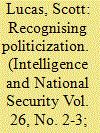

|
|
|
| 12 |
ID:
106596


|
|
|
|
|
| Publication |
2011.
|
| Summary/Abstract |
This article argues that analytic practices and processes within the US intelligence community have undergone far more fundamental reform than the public or scholarly communities recognize. It identifies the dimensions of this 'Analytic Transformation' and explains the reasons for optimism about the future.
|
|
|
|
|
|
|
|
|
|
|
|
|
|
|
|
| 13 |
ID:
106603
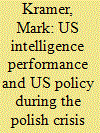

|
|
|
|
|
| Publication |
2011.
|
| Summary/Abstract |
Drawing on intelligence documents that were recently declassified, this article assesses the quality of US intelligence analysis during the 1980-81 Polish crisis and the impact of the intelligence analysis on US policy toward Poland and the Soviet Union. After discussing the value and limitations of the declassified materials, the article raises questions about US policy during the crisis and discusses how intelligence inputs helped to shape policy. The newly available documents confirm that the US intelligence community's analytical products were often deficient and that these shortcomings put a crimp on US policymakers' choices.
|
|
|
|
|
|
|
|
|
|
|
|
|
|
|
|